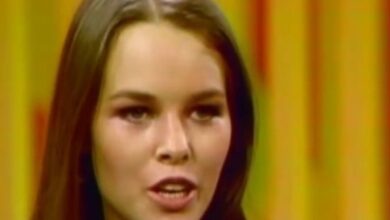Merle Haggard’s “Okie from Muskogee” Sparks a Cultural Firestorm and Defines an Era in 1969
When Merle Haggard released “Okie from Muskogee” in October 1969, few could have predicted that the song would become one of the most polarizing and iconic country hits of its generation. On the surface, it was a simple, catchy tune about small-town pride. But beneath that twangy exterior lay a deep reflection of America’s cultural divide during the Vietnam War era. The song soared to No. 1 on the Billboard Hot Country Singles chart, remained there for four weeks, and crossed into the mainstream as both a celebration and critique of American identity.
Merle Haggard wasn’t new to country music in 1969, but “Okie from Muskogee” vaulted him into a new level of national prominence. Born in Bakersfield, California, in 1937, Haggard had a troubled youth and even served time in San Quentin. But by the late 1960s, he had become one of the most compelling voices in country music, with a raw authenticity shaped by hard-earned experience. Along with Buck Owens, Haggard helped define the Bakersfield sound—a twang-heavy, no-nonsense response to Nashville’s smoother productions.
The inspiration for “Okie from Muskogee” came during a tour bus ride with his band, The Strangers. Passing through Muskogee, Oklahoma—his father’s hometown—Haggard and drummer Eddie Burris began joking about the cultural differences between small-town America and the hippie movement. That lighthearted exchange turned into a serious songwriting session, and in a matter of minutes, they’d crafted what would become one of country music’s most talked-about anthems.
The recording of the song captured the stripped-down essence of the Bakersfield style: clean electric guitar lines, a steady rhythm section, and Haggard’s distinct, unpretentious vocal delivery. Produced by Ken Nelson, the track was straightforward but effective—letting the lyrics, with their plainspoken pride and anti-counterculture stance, do the heavy lifting. Lines like “We don’t smoke marijuana in Muskogee” and “We like holdin’ hands and pitchin’ woo” were delivered without irony, or at least not obviously so.
Upon release, the song was a hit—not just commercially, but culturally. It reached No. 1 quickly and earned Single of the Year at the Country Music Association Awards. While many listeners embraced it as a patriotic stand against the changing tides of the 1960s, others interpreted it as satirical or even tongue-in-cheek. The ambiguity only added to its appeal and sparked widespread discussion in press, radio, and even political circles.
“Okie from Muskogee” became a flashpoint in the culture wars of the late ’60s. In an era marked by protests, psychedelic rock, and long hair, the song offered a voice for the so-called silent majority—those who felt alienated by the counterculture revolution. For some, Haggard became a hero of traditional American values; for others, he was a musical symbol of conservatism. Regardless of where one stood, the song forced a national conversation about identity, class, and belonging.
For Haggard himself, the song was transformative. It expanded his audience beyond the boundaries of traditional country fans and turned him into a figure of national significance. His image as the hard-edged, honest American everyman was cemented with this release. “Okie from Muskogee” opened the door for television appearances, festival headlines, and widespread recognition as the voice of the working class.
The song’s impact on country music was seismic. It marked a turning point where the genre fully embraced political and social commentary. While artists like Johnny Cash had already ventured into this territory, Haggard did it with a directness that struck a nerve. It influenced artists like David Allan Coe and Waylon Jennings, who would carry forward the outlaw country ethos in the 1970s.
“Okie from Muskogee” was covered extensively, most notably by The Grateful Dead during their live sets, blurring the very lines the song claimed to draw. Even Arlo Guthrie, a folk icon, performed it with his own twist. These covers added layers of irony and interpretation, proving the song had transcended its original audience and become a canvas for musical dialogue.
At the time of its release, Haggard was also dealing with personal change—he had recently married fellow country singer Bonnie Owens and was steadily building a family. Though he often claimed he didn’t intend for the song to be taken as seriously as it was, the timing and cultural context made it inevitable. It tapped into something larger than music.
Over the decades, “Okie from Muskogee” has remained a staple of Haggard’s catalog and a regular on classic country radio. It has been included on numerous “Best of Country” lists and anthologies, and it is still referenced in conversations about American music and politics. The phrase itself—“Okie from Muskogee”—has become cultural shorthand for a particular kind of Americana.
The song also helped shape the evolution of socially conscious music. While many rock and folk artists were pushing progressive themes, Haggard offered a different, equally powerful voice. His unapologetic stance encouraged country artists to speak more directly to the concerns of rural and working-class Americans—something that continues to shape the genre today.
Following Haggard’s death in 2016, “Okie from Muskogee” was revisited with fresh eyes. Critics and fans re-examined the song’s duality—its sincere tribute to tradition and its possible undercurrent of satire. This complexity has only enhanced its legacy, showing that even the most seemingly straightforward songs can have layers of meaning.
In the end, “Okie from Muskogee” remains one of the most influential songs in country history. Whether embraced or challenged, it carved out a permanent place in American music by refusing to play it safe. It showed that a three-minute song could stir debate, define an era, and speak volumes about who we are—and who we want to be.





